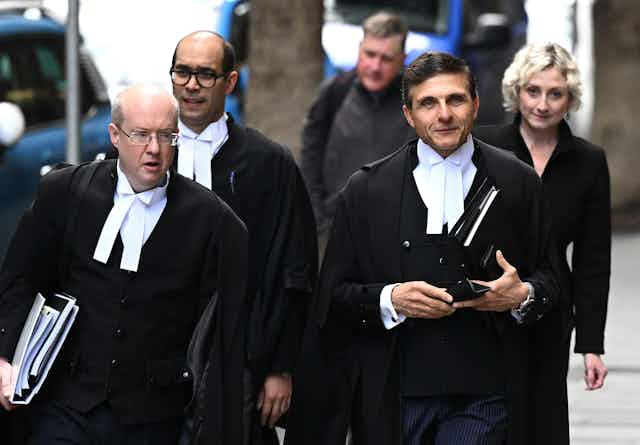Today, Federal Court Justice Anthony Besanko handed down his long-awaited judgment in the defamation case that Ben Roberts-Smith, Australia’s most decorated living former SAS soldier, brought against the Age, the Sydney Morning Herald and the Canberra Times.
The civil trial ended in July 2022 after an astonishing 110 days of evidence and legal submissions. The case was also interrupted by COVID lockdowns.
Besanko determined the newspapers did establish the “substantial truth” of some of the allegations, though not of others. He concluded that in light of these findings, “each proceeding must be dismissed”.
In his judgment, the judge said he was satisfied the most serious imputations were proven on the balance of probabilities, which is the test in such civil cases.
This included allegations Roberts-Smith, in an area known as Darwan in 2012, kicked a handcuffed prisoner over a cliff and ordered other soldiers to shoot him.
Justice Besanko also found the papers established substantial truth in the allegations that in 2009 in the village of Kakarak, Roberts-Smith carried a man with a prosthetic leg to a place outside the Whiskey 108 compound and shot him dead.
Further claims were made that Roberts-Smith had forced a young recruit to execute an unarmed elderly man as a form of “blooding”, which Besanko also found to be substantially true.
All of these allegations were particularly galling to a man who had been awarded the Medal of Gallantry for his actions in Afghanistan in 2006, the Victoria Cross for his bravery in Tizak in 2010, and a Commendation for Distinguished Services for his outstanding leadership in more than 50 high-risk operations in 2012.
Substantial and contextual truth
The legal battle began after a series of articles were published in the Sydney Morning Herald, the Canberra Times and the Age in 2018, alleging that Roberts-Smith, a patrol commander with the Special Air Service Regiment, was a war criminal.
The allegations were based upon witnesses’ accounts of events that took place in Afghanistan between 2006 and 2012.
The newspapers also alleged he had bullied, harassed and intimidated soldiers under his command, and that he committed an act of domestic violence in 2018.
Besanko also found allegations of bullying by Roberts-Smith to be substantially true, but did not find that the newspapers had established the substantial truth of the domestic violence allegations.
The allegations of domestic violence and threats were held to warrant the defence of “contextual truth”. That is, given the newspapers had proved the most serious allegations were substantially true, they could rely on the defence of “contextual truth”. This meant Besanko was satisifed the domestic violence allegations would not further harm Roberts-Smith’s reputation, even though the claims weren’t proven to be substantially true.
The “contextual” truth changes came in a push to have uniformity in defamation laws back in 2005.
According to Australian common law, a statement is defamatory if it exposes a person to hatred, contempt or ridicule, or would tend to make right-minded observers shun or avoid that person. Saying a decorated soldier is a war criminal invariably drew the papers deep into potentially defamatory territory.
The papers had to establish a defence, and their defence was that all of what they had reported was true.
Under the law, they needed only to show the “substantial” truth of what they had alleged. A defendant is thus given some leeway; they do not have to prove every last item is completely true.
Because the papers were able to establish the substantial truth of key aspects of the reporting, Roberts-Smith’s case failed.
Roberts-Smith’s lawyers, who were funded by Seven West Media chairman Kerry Stokes, claimed that some of the witnesses’ testimonies could not be relied upon.
In one case, the lawyers argued this was because the claims were framed in jealousy and based upon an “obsession” with their leader, and in another case that witnesses were “fabulists” and “fantasists”.
However, the imputations supported by the oral evidence of nearly all the witnesses were held to be reliable by Besanko.
What happens next?
It will now be up to the judge, in a further hearing, to determine how much the newspapers will be able to claim back from Roberts-Smith for their reasonable legal costs.
The newspapers requested three weeks to consider how much to seek for costs and third-party costs.
There’s little doubt that both sides have each spent millions on their respective legal teams. The issue of costs may prove just as interesting for observers as the defamation case itself.
Roberts-Smith’s barrister has already raised the possibility that he will appeal.
Read more: Friday essay: why soldiers commit war crimes – and what we can do about it

